
Atlas F1 GP Correspondent
The inaugural Chinese Grand Prix at Shanghai this weekend has been somewhat overshadowed by the recent events in the Formula One, but make no mistake: the sport has been eagerly anticipating the event which many regard as the most important of the year. Atlas F1's Will Gray talked to team owners, marketing directors and F1's leaders and explains why Formula One is looking to the east and what it expects to find there
More and more countries are buying into the sport, paraded by Ecclestone as the biggest global event outside the Olympic Games and football's World Cup, with Turkey arriving in 2005 and other venues waiting in line for a piece of the action. But why exactly is Formula One heading out East?
Put simply, countries around the globe are attracted by the prowess of welcoming such a big event to their home town while the potential of reaching out to new revenues and offering current backers greater visibility has the teams coming back for more. Formula One wants them and they want Formula One.
"We are a World Championship," says Ecclestone. "China is a big part of the world, there is 1.3 billion people, commercially it is good and, obviously, we wouldn't be there if it wasn't important. Bahrain, Turkey, they are all good venues, and I don't know where else we can go but there are plenty of options."
China, of course, is the buzzword at the moment and many insiders claim the Shanghai race is the most important in Formula One. But, more than that, this era is the most important in Formula One, an era of expansion and commercial growth as the teams tumble over a period of cash crisis.
To race, Formula One teams need money, and lots of it. Ferrari run with an estimated annual budget of $300 million (US Dollars) with other big hitters Toyota putting similar expenditure each year and Williams and McLaren, backed by BMW and Mercedes respectively, spending marginally less.
Budgets have been increasing year on year - a concern for not only the teams but the organisers of Formula One - and last week Ford, who own the Jaguar Racing team, announced they will pull out at the end of the 2004 season after admitting even they did not have the cash to compete.
The big concern, and the big reason Formula One is moving out East, is that five of the ten teams on the grid are supported by tobacco companies and will suffer a potentially major revenue loss when a Europe-wide ban on cigarette advertising arrives in mid-2005 before a worldwide ban follows in its wake one year later.
With most of the teams' tobacco contracts based on the worldwide ban, there is an urgency to move away from Europe by next year, and hence, in part, the arrival this year of Bahrain and China, where tobacco advertising is still accepted.
"The teams all signed their contracts to the end of 2006 and we have an EU ban from July 2005," says Max Mosley, president of the sport's governing body, the FIA. "The only way they can observe the contracts is to reduce the number of Grands Prix in Europe to a point where the tobacco companies don't object."
But that is not the only reason for migration from what some commercial gurus call the "stale marketplaces" of Europe. There is a belief that a whole wave of companies are out there just waiting to be wooed by Formula One and that, in part if not in whole, they can become the future of the sport.
"But markets change and our job is to put ourselves in markets that can sustain the sport. We had quite a few visitors from Turkey when we were in Bahrain because Formula One is going there and they are interested. We are looking at them all, all of the time. Wherever we go that is new has to open new possibilities.
"China is key and the Middle East is key. There is a lot of money in those regions. You have to say India should be the next serious location to tackle from that point of view. Turkey is interesting and there is interest there, we know that already without trying too hard. And one thing is for sure: we need to move out of the traditional markets.
"From what we have experienced, finding a Formula One culture is something totally different. Whether the investment will be at tobacco levels I don't know, but there is nothing really, I don't think there is anything, realistically, to replace tobacco."
Phillips, and others who have so far investigated the opportunities of the opening markets, has already discovered that they will take time to wake up and notice Formula One - in the same way that they have been historically slow to impress themselves on the world.
Formula One is there to act as an opening to international acceptance, a simple and effective, although not cheap, advertisement for any country or company wanting to display their potential around the world. Japan and Malaysia have used it, with success, to expand into the global environment, and others have taken heed.
"The benefits to the kingdom of the circuit and the race go far beyond the excitement of the weekend," Fawaz bin Mohammed Al Khalifa, the chairman of the Bahrain International Circuit, said after their inaugural race. "Formula One is a window through which the world can see and feel the true nature and personality of our kingdom."
China, with 1.3 billion inhabitants, is a global superpower that is only just going global. The difficulties of simply prising open its doors to the Formula One roadshow has prevented the race being held in the past and only since their last attempt, in 1998, have things changed enough to break the barriers.
With ingress granted to both the Gulf state of Bahrain and the People's Republic of China, Formula One spent time working to make itself known in destinations that are culturally opposed to the champagne and grid girl lifestyle traditionally played out on the Grand Prix circus.
At both venues it took some adaptation on both sides, with champagne notably replaced by a fizzy fruit juice concoction in Bahrain, but the excitement of the Bahrain race drew hoards across the border to the tiny Kingdom and the Chinese organisers have already obtained a 150,000 sell out for their inaugural race.
The move to pastures new is immediately good for the teams as it offers their current bankrollers a new market to promote their products. The Middle East and China are huge for car companies like BMW and Mercedes as well as technology companies like Williams' backers HP and Ferrari sponsors Vodafone, not to mention the five tobacco brands.
"We ran Ho-Pin Tung last November in a test as a reward for him winning the Asian Formula BMW championship. He did very, very well and as a result of that he clearly got enormous publicity back in China and that reflected well on the team.
"We used him in our marketing and media work in China because he adds the Chinese element to it and he can help explain what Formula One is to the Chinese people. He is someone who has aspirations to become a Formula One driver so we are helping him and he is helping us.
"We will be taking 700 VIP guests so it is an enormously important race for us, we are planning driver appearances for four sponsors in the week leading up to the race and we have a square kilometre of billboard depicting our car. I think that, commercially speaking, it is not understating it to say this is the single most important event of the year."
The China race opens up an important opportunity for Ferrari, too, and team boss Jean Todt says: "We produce over 4,500 cars. This year we will sell about 50 cars in China and we hope that will be 100 cars next year. We just took a license with China and the evolution of China is simply amazing.
"Before we will be able to compare China to the United States, which is over 30 percent of our market, it will take a long time. But countries like China, Russia and India definitely have a huge potential, and they could be the countries for the future."
The new races also supply teams with new markets to fish for backers - Jordan signed a deal with the Bahraini government this year and snapped up two Chinese sponsors before the race in Shanghai – and there is an entire economy in China that has yet to open its eyes to Formula One.
But Jordan's Phillips believes it will take time for China's big hitters to enter the game and admitted: "We have opened the doors but we haven't explored them yet. We are coming across cultures we have not come across before and there is not a motorsport culture so it takes a bit of time for people to understand what Formula One is about.
"There is cautious but optimistic interest being taken. There are no rules, guidelines, manuals or whatever about sponsorship in any sport, but one of the things you know is from a cold call to a cheque in the bank can be normally minimum of 18 months, more likely two years, particularly when you are going into companies that don't actually know what business you are in.
"That is the process we are going through in Bahrain and China at the moment. Bahrain is easier to get to talk to people than it is in China, and there are certain things we have learned in the last year about how we have to approach China so we are taking a slightly different approach to it now than we did a year ago.
"I mean, it is going to be a huge, huge, huge event - we have probably got more guests in China than the whole of the rest of the season put together, both from China and a lot of people wanting to go there. We have already got some Chinese companies and B&Q China have been doing massive promotions, they have got show cars, they are opening almost a store a month over there.
"I think the success of the race is going to be the key to long-term substantial investment. That is part of the game, it is not instantaneous, you cannot convert people overnight. It is not as if there are a million people doing karting or whatever, I mean, just it isn't happening. It doesn't limit the market, it just takes a bit longer to get through to people.
"It is very similar to how we found Japan in the eighties, really. But when the first card crumbled quite a lot came following afterwards. It is very much a matter of waiting for the first commitment. And once that happens there are people pretty hungry to follow suit.
"It is an evolving culture over there (China), but some of the big companies that are run by the old guard, if you like, only look at investment in China because that is all they have ever done. But there are young people taking charge of companies that recognise that they have a potential global positioning. They haven't been welcomed by the rest of the world so you are talking a deep cultural change.
"Just because we are Formula One doesn't mean everyone is going to accept it. We are talking at very high levels with people now but they are cautious because they have always invested inwardly. But what is a good way to establish yourself on a map? Formula One is certainly one of them and I think Formula One will establish itself."
Williams have worked hard to break into China and, despite their link-up with the national television broadcaster, CCTV, who joined after an initial period of backing Jordan, they have had little take-up. They plan to run the logo of current sponsors HP in Chinese lettering but there are no new backers.
Wright, who travelled to Shanghai on an exploratory mission earlier this year, believes his experiences in China concur with those of Phillips and suggests that Williams, a bigger and more successful team than Jordan, will also struggle to draw in Chinese companies in the short term.
"I think that will take time," Wright says. "The Jordan team are the only team to confirm new sponsorship from China. I suspect smaller organisations, the entrepreneurs, want to be part of it and that is great - any new money coming into Formula One is welcome.
"But I suspect corporate China will have a look and see what this phenomenon called Formula One is, they will doubtless begin to understand how this can begin to work for their brands in other, western, market places, but I would expect most Chinese sponsorship to come perhaps in 2005 or 2006. It's not coming in great numbers yet."
The problem for Formula One is that, with an emerging country that already enjoys economic strength, there are many other sports also taking note, moving in, and fighting for similar slices of the financial pie. There is plenty of money around, but there are many, many people aiming to prise it away.
Football, massively popular in China, is only one market that Formula One is fighting with to gain sponsorship contracts from the top companies in the country and Phillips believes the 2008 Olympics in Beijing will also take some of the potential sponsorship market away from Formula One.
"We are up against football, primarily, which of course is very easy for people to participate in," explains Phillips. "You will find a football culture almost everywhere you go, but Formula One is elitist. And what is not necessarily great for Formula One is that they have got the Olympics in 2008 Beijing.
"It is the battle of the two cities, if you like, of establishing these events. They knew they were having the Olympics before they knew about the Grand Prix and there is an eight-year lead-time. That may seem an awful lot but in their terms that is the sort of decision-making time that is required.
"Suddenly all these hungry Formula One teams are descending on them for something that is going to happen within a year and it is not something they are used to. It is not like going to someone in England or Italy or Germany. We have to sell the sport of Formula One."
And it is not only the Chinese companies they have to sell it to, because the question is, with the circuit facility requirements ramped up for every new venue and franchise fees for the races themselves escalating out of all proportion, is the exposure really worth the massive outlay for the hosts?
These days, it requires much more than that and estimated figures range from $100 million (USD) to build the Bahrain facility, through $200 million (USD) in Turkey, reduced thanks to subsidies, to the mind-boggling total of $325 million (USD) spent on the new state-of-the art Shanghai venue.
Formula One has rocketed off the sporting event spending scale. Bahrain, a kingdom with a population of 600,000, is spending $18 million per year for their piece of Formula One action yet they drew in just 35,000 spectators for their first event.
China could have sold out their track many times over, but they are lashing out a reported $40 million per event, while Turkey will be desperately hoping they can fill the 160,000 capacity at their still-to-be-built Istanbul track to recoup some of the $13.5 million per year franchise fee.
Most Formula One events make a loss, but in most cases that loss is cushioned by the input of government funding, which is easily obtained when the sport can claim huge worldwide viewing figures. The Bahrain race certainly put the tiny island on the map and the Chinese event is sure to show that Shanghai is no longer in hiding from the outside world.
Both Wright and Phillips believe, from past history, that the latest two races and the new venues on the horizon will eventually become a resounding success and, when questioned whether the races will take off, Wright rapidly responded: "I would definitely say that. I have absolutely no reservations whatsoever.
"In Bahrain, although the crowds were low, it's important to understand that they were on target - they anticipated a crowd of 35,000 and that's what they got. I think those targets will grow in 2005 but what I think is going to be more important in 2005 is the corporate hospitality.
"That will grow significantly because before this year's race there were a lot of silly stories about security and I think that put off a lot of sponsors. The race went ahead with no problems at all and I am sure the corporate world will now think we can go to that area and we can develop it and we can develop our marketing in the Middle East through our race in Bahrain.
"We support all of the moves that Formula One has made into these new territories and we have been very, very active in all of them. We've been in Japan a long time and Malaysia has been there since 1999, and it is a question of people understanding.
"In Europe people have a great understanding of what Formula One is but further afield it is much more difficult for people to understand why you are enthused by Formula One and why it is such a phenomenon back in Europe because the time differences don't allow them to have the same level of television programming.
"I think China is on an altogether different scale to Malaysia and I think the race will develop a huge demand for Formula One in China. I think Turkey's going to be a very exciting Grand Prix, too, because Istanbul has a population of 14 million people, right on the doorstep of the circuit.
The Sepang facilities, just outside the rapidly modernising metropolis of Kuala Lumpur, first trumpeted in the 1999 Malaysian Grand Prix as the world's most advanced racetrack, now seem almost sub-standard when looked at alongside the colossal projects in Bahrain and China. And the new venues are likely to be even better.
India are already working on their plans while Russia, who have had two failed attempts so far but remain keen on hosting a race in the future, the developing oil-rich country of Azerbaijan and Egypt, who are planning a spectacular track near the Pyramids, are all waiting in line.
"I think we could have up to 30 races in the future," said Ecclestone in one of his typically controversial statements. But it is true. The calendar spread to 18 races this year and will expand further to 19 venues next season for the first time in its history. And Ecclestone is eager for more.
The teams, however, are likely to prevent the continued expansion of Formula One into a world series, with many already flaking at the thought of yet another race next year and others speaking of the need for two teams if the Championship follows the United States NASCAR example of racing virtually every week.
Realistically, however, that is not financially viable for even the richest Formula One teams - especially in a climate where demands for cost cutting create more headlines than race results - and the sport will surely settle, as it did in the 1990s, on a calendar that offers everything it needs to survive.
Some European races will survive the cull, as long as they meet Ecclestone's financial requirements aside from the passionate demands of the fans, and the heart of the sport is sure to remain in the Western world. But Formula One is finally becoming global, not before time.
The shimmering skyscraper-filled city of Shanghai this week joins the baking hot Middle East desert Kingdom of Bahrain as a newcomer to the world of Formula One and the two locations, venues for the first time on a Grand Prix calendar this year, have already changed the face of the sport forever.
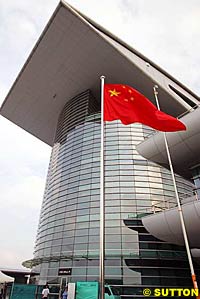 Against all odds, Formula One has overcome the dumfounding dominance of seven-time World Champion Michael Schumacher and his all-conquering Ferrari team and begun to succeed in the final part of commercial rights holder Bernie Ecclestone's masterplan to become a true World Championship.
Against all odds, Formula One has overcome the dumfounding dominance of seven-time World Champion Michael Schumacher and his all-conquering Ferrari team and begun to succeed in the final part of commercial rights holder Bernie Ecclestone's masterplan to become a true World Championship.
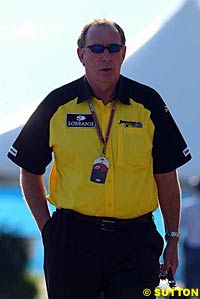 "We are crying out for new markets because we were getting towards saturation in Europe," Ian Phillips, Director of Business Affairs at the Jordan team, states. "While we have been underwritten by the tobacco companies, the traditional markets have been able to come in a top things up.
"We are crying out for new markets because we were getting towards saturation in Europe," Ian Phillips, Director of Business Affairs at the Jordan team, states. "While we have been underwritten by the tobacco companies, the traditional markets have been able to come in a top things up.
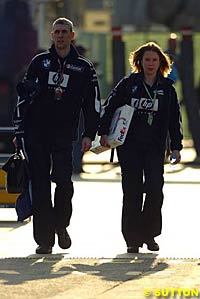 Williams sponsorship manager Jim Wright is eager to get to China, and says: "What I have seen there is an incredible appetite for Formula One and from our point of view we know that every single one of our sponsors is interested in the Chinese market.
Williams sponsorship manager Jim Wright is eager to get to China, and says: "What I have seen there is an incredible appetite for Formula One and from our point of view we know that every single one of our sponsors is interested in the Chinese market.
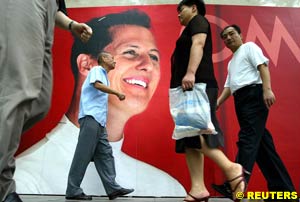 "But our approach a year ago was out of ignorance really. We got some extremely good comeback from there but I think they need to get to know an awful lot more about Formula One than the Bahrainis do. The Bahrainis are in touch with what is going on, I don't think the Chinese are at all.
"But our approach a year ago was out of ignorance really. We got some extremely good comeback from there but I think they need to get to know an awful lot more about Formula One than the Bahrainis do. The Bahrainis are in touch with what is going on, I don't think the Chinese are at all.
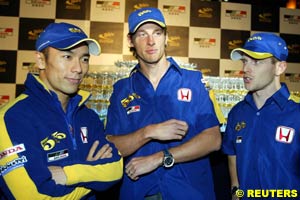 BAR-Honda are expected to run a third car in a livery representing the 555 brand of part-owners British American Tobacco because their Lucky Strike brand - which permanently adorns the cars - is not well recognised in China. But that is another adaptation of a current sponsor rather than a new backer entering the sport.
BAR-Honda are expected to run a third car in a livery representing the 555 brand of part-owners British American Tobacco because their Lucky Strike brand - which permanently adorns the cars - is not well recognised in China. But that is another adaptation of a current sponsor rather than a new backer entering the sport.
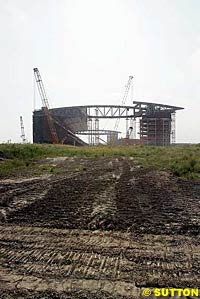 In the past, running a Formula One race would mean pitching the idea, creating a track wide enough and safe enough to cope with the cars, constructing a pits complex with some buildings that would house the teams and adding bunch of stands to pack in the fans who were desperate to get a piece of the action.
In the past, running a Formula One race would mean pitching the idea, creating a track wide enough and safe enough to cope with the cars, constructing a pits complex with some buildings that would house the teams and adding bunch of stands to pack in the fans who were desperate to get a piece of the action.
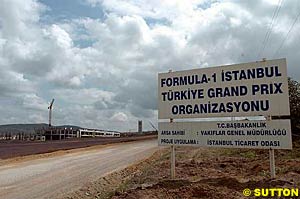 "Turkey is a developing market, again, for most of our sponsors, and I expect India will be the next one to join. That would be welcomed with equal enthusiasm to China by the sponsorship fraternity in Formula One, and all these venues help make Formula One a true World Championship. It is all a very positive thing."
"Turkey is a developing market, again, for most of our sponsors, and I expect India will be the next one to join. That would be welcomed with equal enthusiasm to China by the sponsorship fraternity in Formula One, and all these venues help make Formula One a true World Championship. It is all a very positive thing."
|
Contact the Author Contact the Editor |
Please Contact Us for permission to republish this or any other material from Atlas F1.
|
Volume 10, Issue 38
Atlas F1 Special
Jaguar: All Out of Lives
Last to Know, First to Go
The Tarnished Mascot
Articles
The Gold Rush
Revved Up: Q&A with Shoichi Tanaka
Every Other Sunday
2004 Chinese GP Preview
2004 Chinese GP Preview
Chinese GP Facts & Stats
Columns
The F1 Trivia Quiz
Bookworm Critique
On the Road
Elsewhere in Racing
The Weekly Grapevine
> Homepage |